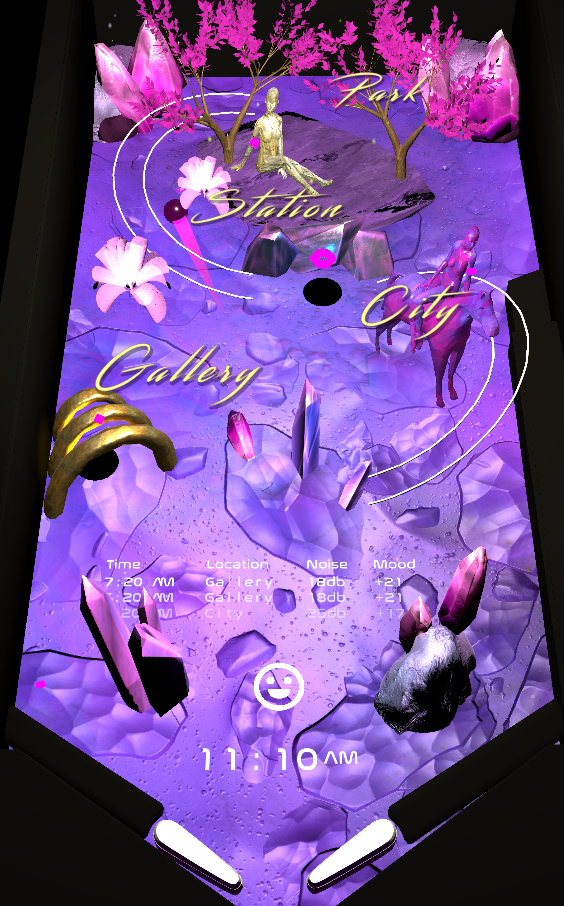Mood Pinball
What’s your city sweet-spot? Mood Pinball playfully reimagines how city-wide data might be used by an individual to find their comfort zones, and improve their experience of a city. Through a physical digital pinball machine, an online game and downloadable app with a data set buried deep in the heart of the code, the game invites us on a sonic journey through the dreamlike city-scape of neurodiverse artist Edie Jo Murray, who also exhibited as one of the seven artists of ‘WONDER: Where Reality and Imaginary Collide’ at the Herbert Art Gallery & Museum.
The otherworldly qualities of Mood Pinball’s highly stylised graphics and rich saturated colours are based on personal experiences of “feeling like aliens” as autists. When visiting different locations volume levels in decibels are shown. As the clock progresses noise levels change. For Edie, her sensitivity to noise – which has an impact on how well she feels at different city locations – is part of the “alien experience”.
The goal of Mood Pinball is to keep its Mood-o-Meter at ‘happy’, by responding to noise-level data revealed during gameplay. The ball also has an energy level, and constant, long-distance movements tire it out.
Mood and energy boosts can be achieved when visiting locations and represent a successful day’s shopping or a pleasant visit to the park.
Accessing data about noise levels in public spaces is difficult, so the data in this artwork has been synthesised by computer scientists at Southampton University. Mood Pinball acts as a reminder that individuals, as well as businesses, need to use information and data to better understand the world and improve people’s lives. Accompanying the games are a series of animated GIFs created by the artists to raise key questions which informed and are raised by the work, and a short CGI film offering us a “pinball’s-eye-view” through the inner landscapes of the game.
About the Artists
Ben Neal (UK) is a creative technologist, performer, musician, artist and educator. His work often uses audio-visual and digital technology to create bespoke electronic gadgets, interactive art, musical instruments, virtual content and games. He is part of the Swoomptheeng art collective, digital producer at BOM, and works freelance as Psicon Lab.
Edie Jo Murray (UK) is a West Midlands-based digital artist who focuses on exploring the subjectivity of reality from a neurodivergent perspective. Her practice includes virtual and augmented reality installations and computer generated imagery, used to examine and highlight individualised relationships with reality.
Harmeet Chagger-Khan (UK) is an artist and filmmaker producing site specific projects with a diverse range of individuals to harness their polymathic qualities and create subtle behaviour change within communities, organisations and cities. As a BOM (Birmingham Open Media) Fellow and Resident at Pervasive Media Studio, Bristol she is currently exploring how technology, locative storytelling, immersive media and live art can create antidotes to life.
Original digital pinball machine commissioned by ODI Data as Culture in partnership with the University of Southampton / King’s College London Data Stories project, supported by the EPSRC, grant number EP/PO25676/1. Produced by BOM centre for art, technology and science, Birmingham. Online developments commissioned by ODI Data as Culture. Android app co-commissioned with Now Play This festival 2020.






